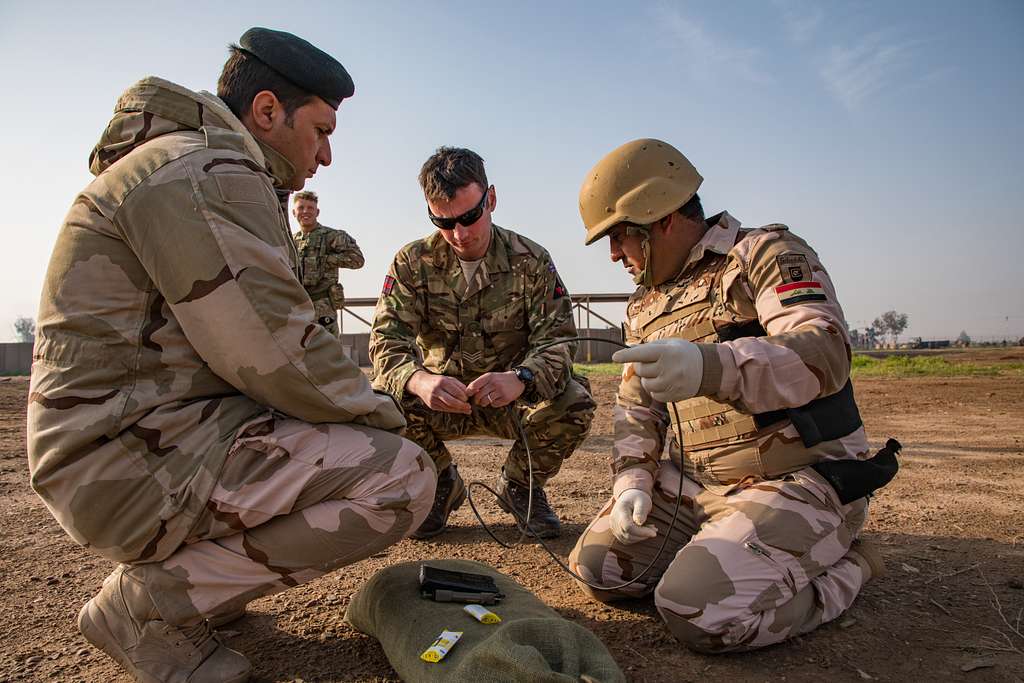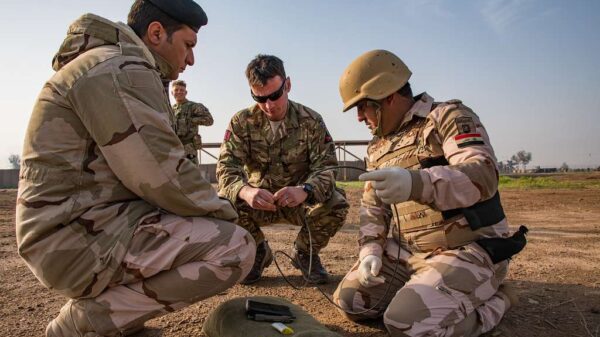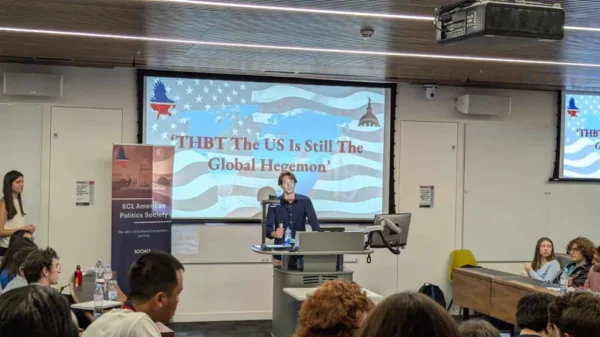Guest Writer Danial Ahmed examines the potential consequences of a war with Iran, drawing parallels to the Iraq invasion and questioning Britain’s foreign policy priorities in the face of domestic challenges.
Precisely 21 years ago, Tony Blair stood, just a few minutes away from Strand Campus and delivered his famous speech, asking the British public to brace themselves for an invasion of Iraq. His brash decision wasted the finest men Britain had to offer.
British blood, British treasure, was thrown into the sandy wastes of a far-flung region, to bring forth a terror and chaos the world had long forgotten. Blair boldly declared that this issue would ‘determine the pattern of international politics for the next generation’. Right he was, for the spectre of Iraq looms large over Britain, threatening again to materialise in the form of a war with Iran. Again, Sir Keir Starmer, a successor of sorts, threatens Iran and asserts himself in a faux strongman manner in the Middle East, whilst bowing to American pressures and handing over British territories to foreign nations.
War with Iran would be suicide for Britain – in many ways
There is no debate as to the nature of the Iranian regime. It is an undemocratic theocracy that has goals in the Middle East that are antithetical to Britain’s. But we are not a nation pure in morals. Starmer’s bold declarations of restoring democracy ignore our tacit support of other despotic characters throughout the world. They serve as a mere façade for appeasing Israel, an ‘ally’ that has betrayed us, fought against us and wasted our goodwill since its inception. The ‘special’ relationship that Britain has shared with Israel was one that saw the Argentines supplied with missiles during the Falklands Crisis, the Chinese given Western military secrets and a relationship that saw the glorification of Menachem Begin, whose hands are so soaked in British blood, that even the ides of time will not wipe them.
The appeasement of Israel is now edging us closer to a war with a people that have yet to harm us. No Iranian terror group has attacked Britain, or the wider Western world for that matter. But we will happily march into the meat grinder, spurred on by the Israelis who will watch from their sidelines in Tel Aviv, just as they did in Iraq. Benjamin Netenyahu then promised a more peaceful Middle East with Saddam’s removal and now he peddles the same scheme. But make no mistake – it is our men, our women, and our children who will suffer yet again if we foolishly charge into Iran.
Our soldiers may come home unharmed, but they will leave their souls in Iran, just as they did in Iraq. A generation of men forever regretful of their decision, shamed by society for carrying out a duty mandated by the grey suits in Westminster, whose demagoguery is rewarded by lucrative speaking gigs in Israeli affiliated thinktanks. The decision to attack Iran will reward us with a generation of Britons so damaged by war, that we may never recover. I urge you, dear reader, to implore all those who listen, to avoid a conflict in the Middle East. For British blood is too precious to be wasted for the sake of a foreign nation.
Our ‘special’ relationship aside, war with Iran will have material consequences that will cripple Britain. Gone are the heydays of the late 19th and 20th century, where Britain’s industry was booming. Where we could rely on British oil, gas and energy. We have become a consumer island that depends heavily on imports from other nations. Iran has threatened that they will not let a ‘single drop of oil’ leave the Gulf if their sovereignty is compromised.
⚡️BREAKING
— Iran Observer (@IranObserver0) October 2, 2024
Not a single drop of oil or gas will leave the Middle East if there is a war, Winter is near for Europe – Senior official of Iraq's PMU pic.twitter.com/WYEjotC9nk
Our nation runs on oil to drive our lorries, to power our cars as we head to work and crucially, it allows us to be linked with the rest of the world via our airports. To those with stonier hearts, consider what a war might do to your finances. Mere spikes in tensions in the Middle East have and will continue to, wipe out large chunks of our most valuable companies. We were fortunate during 2003, in that the Gulf nations kept producing oil to stave off the drop in production. However, Iran’s proxies stand ready in the Gulf and have promised the GCC nations that they will burn, should Iran be threatened. And those threats are not empty.
It was merely a decade ago that Bahrain teetered on the edge of collapse and despite its best efforts, Saudi Arabia only strengthened the resolve of the Houthi government in Yemen. Iran is ready for a long war and will risk everything for it, which means that we must assess just how far they will take their vengeance. But the international is not a zero sum game. Britain must be rational and act accordingly. Unlike our counterparts across the Atlantic, our meagre state of domestic oil production will not be a sufficient replacement for what we import. And our Treasury no longer commands the economic prowess it once did.
Iraq cost us more than 8 billion pounds. Iran is likely to cost us more, especially in an era where inflation has skyrocketed and raw material prices and rising taxation have done little to stave off the impending ‘black hole’ in our national finances. We cannot afford to pay our pensioners to heat their home, but we can afford to spend countless billions on the American Military Industrial Complex? Our primary priorities lie with the natives of this country, the taxpayers who struggle every day to make ends meet. We must make them wealthier, not sacrifice them for a foreign cause. They are too precious, too few and too important. We must highlight that our duty is to those at home, for Britain has already done too much for the ungrateful many.
In the face of growing uncertainty, Britain must consider her position in the world. We stand alone in Europe, shunned by the EU as our feckless politicians give concessions of prized overseas possessions to nations who have done little to earn them. Our Atlantic counterparts don’t have our best interests at heart and will put us in the hot seat to avoid blame and damage. It is in this uncertainty, that we must look inward and reflect on who we are, before we are dragged into war that may cause unforetold damage to ourselves and the world.


















